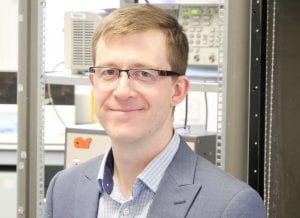Dr Daniel Whitcomb is a Senior Lecturer in Translational Neuroscience in the Faculty of Health Sciences.
Tell us about your journey into academia…
During my undergraduate degree (BSc Psychology, Warwick University), I became really interested in understanding the cellular mechanisms for the cognitive processes I had studied. I wanted to undertake a PhD, but felt there were gaps in my knowledge and that I needed to bridge between what I had learnt in my degree and what I wanted to further study. After a lot of research, I decided to undertake the MSc Molecular Neuroscience course here at the University of Bristol.
I spent a brilliant (albeit intensive!) year studying on the programme, and had my first real experience of laboratory work during a 3-month research project. On completing the degree, I began a PhD in Bristol studying the molecular mechanisms of Alzheimer’s disease. Following on from this, I undertook a Wellcome Trust/Medical Research Council postdoctoral research associate position with the lab I completed my PhD in. I was then appointed Lecturer in Translational Neuroscience, my current position here in Bristol. I now run my own research team where we try to understand the molecular basis of neurodegenerative diseases.
Interestingly, my academic journey has somewhat circled around to where it began; I am now the Co-Director of the very same MSc Molecular Neuroscience programme that I undertook which has allowed me to pursue this career! I therefore have the arguably unique perspective of both a student of the programme and now a member of staff on it as well!
What tips do you have for prospective postgraduate students?
I think it is important to identify which postgraduate programmes are going to offer you the opportunity to develop the skills you need to achieve whatever your ultimate goals are. This means researching programmes and determining if they cover the content/materials that you need to achieve your ambitions. There is usually a lot of information available in programme outlines online, but I also think there is real value in making contact with programme leaders, students etc, and asking questions.
What’s your experience of events at Bristol?
I always find the events at Bristol really exciting – it’s great to talk with prospective students and hear what they have been studying and what their ambitions are. I like being able to answer questions students have and offer additional insight into postgraduate study.
What are the common questions you often get at an event?
I am often asked about programme content and what kind of topics are covered. Students are also usually very interested in learning more about the research projects that we offer on the course. Getting into the lab is a really exciting aspect of our programme, so students want to hear about the sorts of techniques and approaches they will learn.
Why is it important to attend the events?
I think the events are important because they give you direct access to academic members of staff. This is hugely valuable, as you hear directly from them and have the opportunity to ask important questions that will help you decide whether a programme is right for you.
Register today


